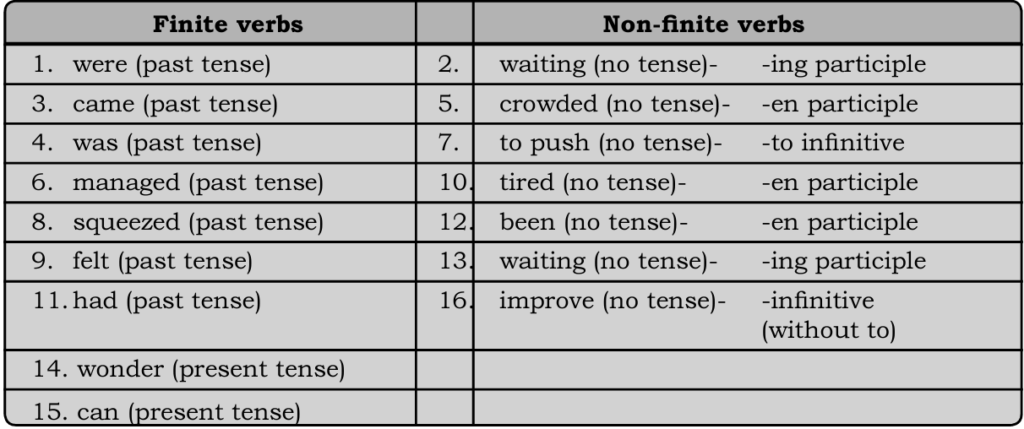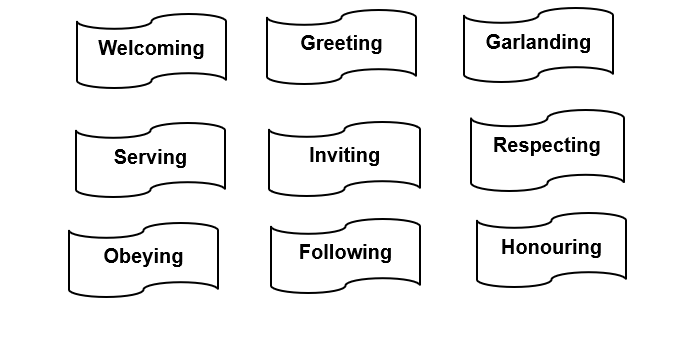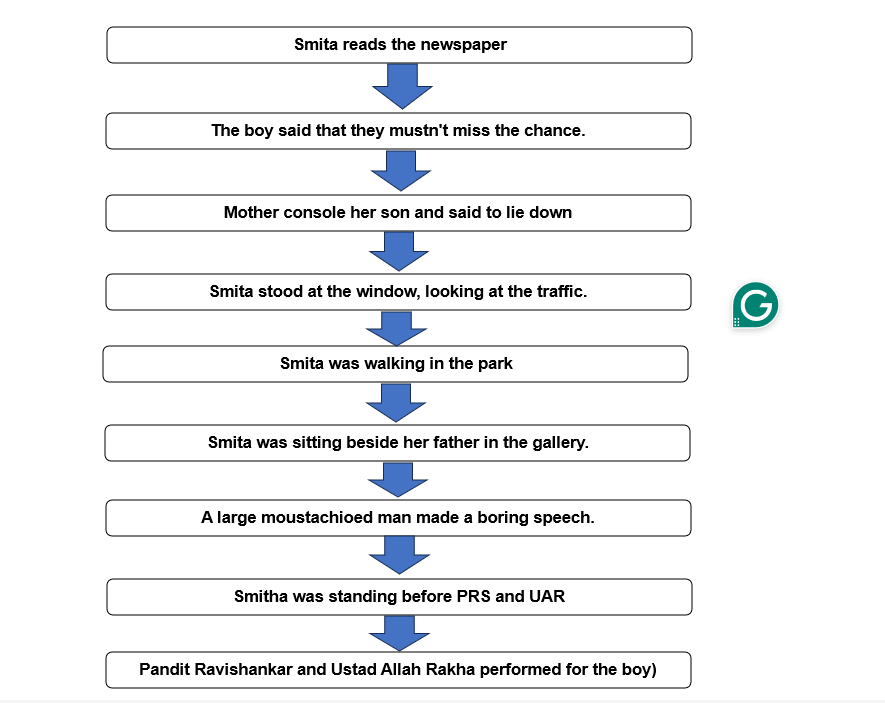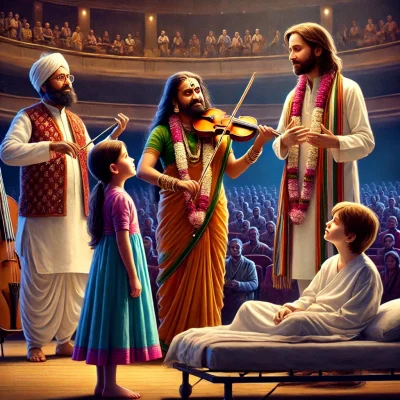SSLC English Question and Answer: The Concert
Looking for SSLC English Studies textbook answers? You can download Chapter 5: The Concert Questions and Answers PDF, Notes, and Summary here. SSLC English 2nd Language solutions follow the Karnataka State Board Syllabus, making it easier for students to revise and score higher in exams.
Karnataka SSLC 2nd Language English Textbook Answers—Reflections Chapter 5
The Concert Questions and Answers, Notes, and Summary
Class 10 2nd Language English Chapter 5
The Concert
Scroll Down to Download The Concert PDF
Comprehension I: The Concert
Question 1:
Which word in the first paragraph describes the manner of the girl when she saw the newspaper?
Answer:
The word “excitedly” describes the manner of the girl when she saw the newspaper.
Question 2:
Why do you think the mother cautioned the girl?
Answer:
The mother cautioned the girl because her son was suffering from cancer and was in the final stage of his illness. His body was extremely weak, and he required sleep and complete rest.
Question 3:
“We mustn’t miss the chance.”
a) What chance did the boy not want to miss? Why? Do you think the boy would get a chance in the future?
Answer:
The boy did not want to miss the opportunity to listen to Pandit Ravi Shankar’s sitar recital. He had always longed to hear and see Pandit Ravi Shankar perform but never had the chance before. Whether he will get another opportunity in the future is uncertain, as we cannot predict what will happen. He may or may not have another chance.
Question 4:
Imagine you were the boy’s mother. Would you have reacted differently in this situation? If so, how?
Answer:
Anant’s mother reacted appropriately under the circumstances. However, if we consider a different perspective, special arrangements could have been made to fulfil his heartfelt desire to see and listen to Pandit Ravi Shankar. It would have been our duty to make his wish come true.
Question 5:
Read the third paragraph: “He raised himself without any help. The mother murmured with a catch in her throat on seeing him.” What does this suggest about the boy’s condition? Read the fourth paragraph and answer.
Answer:
The boy was suffering from a severe illness and had been bedridden. The mother’s emotional reaction upon seeing him sit up without assistance suggests that he was usually dependent on others for even basic physical activities. This indicates his frail condition and the gravity of his illness.
Comprehension II: Share your Responses: The Concert
Question 1:
For a moment, Smita had forgotten something. What was it?
Answer:
For a moment, Smita had forgotten that her brother was very ill.
Question 2:
In what way was the truth truly frightening to Smita?
Answer:
Smita knew that Anant was going to die. The word cancer loomed over them, and the realization that her brother was dying was deeply frightening to her.
Question 3:
Do you consider Anant a talented boy? Justify your answer with support from the text.
Answer:
Yes, Anant was a talented boy. According to the text, he had a natural gift for music and, despite being at the beginning of his musical journey, he was already able to compose his own tunes. His guru was astonished by his abilities, which further proved his talent. Additionally, he was the best table tennis player in his school and the fastest runner, showcasing his exceptional skills in both sports and music.
Question 4:
“They had come with high hopes.”
a) What were their high hopes?
b) Do you think their hopes would be fulfilled? Support your answer.
c) The doctors said something to the parents. Were their words of hope or despair? (Refer to paragraph 6.)
d) “They did not voice their fears.” Who does the word they refer to?
i) Doctors
ii) Friends
iii) Family members (Choose the correct answer from paragraph 6.)
Answer:
a) They came with hopes that modern medical advancements would work a miracle. They believed Anant would be cured at the hospital, regain his health, and even participate in the table tennis tournament.
b) Based on medical records, it seems their hopes would not be fulfilled, as the doctors had lost faith in his recovery. They advised the parents to take Anant home, believing no treatment could save him. However, there is always a slight possibility of a miraculous recovery.
c) The doctors told the parents to take Anant home and let him have whatever he wished for. These were words of despair, as doctors usually give such advice only when they know the patient cannot be cured. Instead of strict treatment, they wanted him to spend his remaining time happily.
d) iii) Family members.
Question 5:
“Her eyes filled with tears.” Were they tears of happiness or sorrow? Give reasons.
Answer:
They were tears of sorrow. When Anant expressed that listening to Pandit Ravi Shankar was the chance of a lifetime, it was deeply ironic, as he had very little time left. Smita, who knew her brother’s days were numbered, was overwhelmed with sadness, leading her eyes to fill with tears.
Question 6:
“Suddenly, a daring thought came to her.” Can you guess what thought Smita had?
Answer:
Smita’s daring thought must have been to fulfill her brother’s wish of listening to Pandit Ravi Shankar. She likely decided to make his dream come true, as she believed it was the chance of a lifetime for him. However, at this point in the story, readers are not yet aware of how she plans to achieve this.
Comprehension III: Share your Responses: The Concert
Question 1.
The word ‘gasp,’ according to the dictionary, suggests surprise or pain. Which meaning is relevant in this context? (Para.10)
Answer:
In this context, the meaning of ‘gasp’ refers to pain.
Question 2.
As Smita sat listening to the music, she was spellbound. But all the while, her mind was echoing something else. What was it?
Answer:
While Smita was mesmerized by the music, her mind kept echoing the plan she had decided upon the previous evening. It remained firmly in her thoughts.
Question 3.
Why does the writer use the word ‘wriggled’ to describe Smita’s movement?
Answer:
The word ‘wriggled’ is used because Smita was in a crowded place and feeling extremely anxious. Her heart was pounding, her knees felt weak, and she was unable to walk straight. Instead, she moved forward in a wriggling manner, trying to make her way through the crowd.
Question 4.
Smita’s nervousness is suggested by the phrase ‘her heart beating loudly’ in paragraph 12. Identify two more phrases from the next paragraph that describe a similar state.
Answer:
Two more phrases that indicate Smita’s nervousness are:
(i) Her knees felt weak
(ii) her tongue dried
Question 5.
Did Smita share her thoughts with the musicians? Who responded to her request immediately, and what was the response?
Answer:
Yes, Smita openly shared her thoughts with the musicians. Ustad Allah Rakha was the first to respond immediately. He assured her that the next morning, they would perform for her brother.
Question 6.
Do you think the response of the artists was unusual? Why or why not?
Answer:
Yes, the response of the artists was unusual. Renowned musicians like Pandit Ravi Shankar and Ustad Allah Rakha are usually very busy and rarely have time for personal requests. However, this was a special case, and they showed immense generosity and compassion by agreeing to perform. Their act of kindness was truly commendable.
Question 7.
The neighbours could not believe their eyes. Why do you think they felt this way?
Answer:
The neighbours were in disbelief because Pandit Ravi Shankar was a world-famous musician, and it was incredibly difficult to secure his time. They could hardly believe that such a legendary artist had come to a modest home to perform.
Question 8.
Read the last paragraph, which briefly yet effectively describes the end. Discuss your thoughts with a partner.
Answer:
The last paragraph evokes mixed emotions in the reader. On one hand, it is heartwarming to know that the boy’s final wish was fulfilled. On the other hand, it is heartbreaking that he passed away while listening to his favorite sitar music. However, Smita, her parents, the musicians, and all who cared for the boy must have found some comfort in knowing that his last desire was fulfilled.
Question 9.
Can you say that the concert was entertaining for Smita? Justify your answer.
Answer:
Yes, the concert was more than just entertaining for Smita. As she listened to the music, she felt as if the gates of enchantment and wonder had opened before her. She was completely spellbound. However, at the same time, she was anxious about her brother’s wish and unsure whether the maestro would agree to perform for him. This mix of emotions made the experience both magical and overwhelming for her.
Question 10.
Smita was nervous as she stood before the maestro. Which sentences suggest this?
Answer:
Smita’s nervousness is suggested by the following sentences:
(i) her heart beating loudly
(ii) her knees felt weak
(iii) her tongue dried
Question 11.
Did Pandit Ravi Shankar and Ustad Allah Rakha perform at the boy’s house? Do you think this was an unusual event? If yes, give reasons.
Answer:
Yes, they performed at the boy’s house, and it was certainly an unusual event. Such distinguished artists rarely give private performances, as even securing their dates for public concerts is a challenge. Additionally, Smita’s family was neither wealthy nor influential, and their home was a small apartment. All these factors made the event truly extraordinary.
Think About The Text: The Concert
Question 1.
Do you like the story? Why?
Answer:
I like this story because:
a) It revolves around the theme of music.
b) It is based on a real-life incident.
c) It conveys deep emotions and has a touching narrative.
d) It highlights the greatness of renowned musicians.
e) It emphasizes humanity and kindness.
f) It showcases compassion and selflessness.
Question 2
In your opinion, which words in the list below describe Anant’s character or state? Write Yes/No in the space given.
Answer:
Question 3.
Look at the following phrases in the lesson. They are descriptive. Categorise them in columns ‘A’ and ‘B’ appropriately. {spellbound; unfolding the gates of enchantment; plaintive notes; fast twinkling ones; f irst notes; wonder; dream; unfolding ragas.}
Answer:
Question 4.
Ustad Sahib and Pandit Ravi Shankar agreed to perform for the boy. What made them agree to do so? What would you have done if you were the musician?
Answer:
Ustad Sahib and Pandit Ravi Shankar agreed to perform for the boy because he was in the final stage of his life, and it was his last heartfelt wish to listen to their music. Since he was too weak to attend the concert, the musicians, moved by his condition, decided to fulfil his wish out of kindness and compassion.
If I were in their place, I would have done the same, as bringing comfort and happiness to someone in their final moments is a deeply humane and noble act.
Question 5.
What arrangements would you make if Pandit Ravi Shankar and Allah Rakha were coming to your house? [You may include in your answer such arrangements—one example is given. Think of others and write them in the bubbles. Note: Answers need not be the same for all.
Answer:
Question 6.
Do you like the ending of the story? Why? If you don’t, how would you like to end it?
Question 7.
Suppose you are Smita and invite Pandit Ravi Shankar (PRS) to your home. Imagine the conversation that follows and write it. Some clues are given.
Smita: Good evening, sir. May I have a word with you, please?
PRS: Well?
Smita: My brother is a great fan of yours.
PRS: I’m glad to hear that. Is he here?
Smita: No, he can’t come. He is suffering from cancer.
PRS: I’m sorry to hear that. How can I help?
Smita: Would you please come with me to see him?
PRS: (Looking at others) What do you say?
Smita: Please, I beg you all to come and play for him.
Moustachioed Man: Are you joking? Do you know whom you are talking to? Don’t bother them with such silly talk.
PRS: Sh! (Silencing him) What do you say, Ustad?
Ustad Allah Rakha: (After some thought) Don’t weep. Don’t worry, child. We’ll be there tomorrow.
Question 8.
In the course of the story, who do you consider to be more worried, Smita or Anant? Have a discussion with the partner/in-group/in the class.
Answer:
In the course of the story, Smita worries more. While Anant was suffering physically, his main concern was his final wish to hear Pandit Ravi Shankar. On the other hand, Smita was not only concerned about her brother’s health but also about fulfilling his last desire. She faced emotional turmoil, trying to make the impossible happen.
Question 9.
a) Smita bit her lip in self–reproach.
b) A large moustachioed man gave a long, boring speech.
c) Smita read the newspaper and got excited.
d) Pandit Ravi Shankar and Ustad Allah Rakha started playing in the boy’s house.
e) Smita was lost in her thoughts in the park.
f) Mother said, ‘This is not the last time they are going to play.’
g) Anant said, ‘It’s the chance of a lifetime.’
Answer:
c) Smita read the newspaper and got excited.
g) Anant said, “It’s the chance of a lifetime.”
a) Smita bit her lip in self-reproach.
f) Mother said, “This is not the last time they are going to play.”
e) Smita was lost in her thoughts in the park.
b) A large moustached man gave a long boring speech.
d) Pandit Ravi Shankar and Ustad Allah Rakha started playing in the boy’s house.
Question 10.
a) Identify the paragraphs in which the incidents stated above occur.
Answer:
1. Paragraph 1
2. Paragraph 5
3. Paragraph 9
4. Paragraph 12
5. Paragraph 7
6. Paragraph 13
7. Paragraph 16
b) Read each paragraph again and summarize them in your own words.
Paragraph 1: Smita gets excited after reading the newspaper about Pandit Ravi Shankar’s performance.
Paragraph 5: Anant expresses his desire to listen to Pandit Ravi Shankar, calling it “the chance of a lifetime.”
Paragraph 9: Smita feels guilty as she reflects on her brother’s illness and her inability to make his wish come true.
Paragraph 12: Smita’s mother reassures her, saying that this won’t be the last opportunity for Pandit Ravi Shankar to perform.
Paragraph 7: Smita walks in the park, lost in her thoughts about how to fulfill her brother’s last wish.
Paragraph 13: A moustached man speaks at length, but his words don’t seem to help Smita’s situation.
Paragraph 16: Pandit Ravi Shankar and Ustad Allah Rakha arrive and begin playing music in Anant’s house, fulfilling his last wish.
Question 11.
Match the following:
Answer:
1. The person who discouraged the girl was the moustached man.
2. The person who made the request was the girl, Smita.
3. The person who gave the consent finally was Pandit Ravi Shankar.
4. The person who suggested the time of the concert was Ustad Allah Rakha.
Enrich your vocabulary:
Task 1: Complete the crossword with the help of the following clues—across and down. Refer to the dictionary for any help.
Read and respond
Task 1: Read the lesson carefully and represent the events/incidents in the flowchart. You may have as many boxes in between as you think appropriate.
e. g.: Some verbs are underlined in the passage given below. See how they are classified into finite and non-finite verbs.
They were (1) waiting (2) for the bus. After a long time, it came (3). The bus was (4) heavily crowded (5). Anyway, they managed (6) to push (7) through and they squeezed (8) themselves in. They felt (9) tired (10) as they had (11) been (12) waiting (13) for long. I wonder (14) who can (15) ever improve (16) our transport system. 101Finite verbs and Non-finite verbs

Task 1: Read the paragraph and classify the underlined verbs into Finite verbs and Non-finite verbs. Write the tense of the finite verbs and the type of non-finite verbs. Two examples are given.
Smita bit her lip in self-reproach. She had been so excited at seeing the announcement that she had not remembered that her brother was very ill. She had seen how the doctors had shaken their heads gravely and spoken words that neither she nor even her parents could understand. But somewhere deep inside, Smita had known the frightening truth that Anant was going to die. The word cancer had hung in the air. Her brother was dying of cancer even though she pretended that all would be well and they would return together, a small family of four, to their home in Gangapur. And he was only fifteen, and the best table tennis player in the school and the fastest runner. He was learning to play the sitar; they were both taking sitar lessons, but Anant was better than her in many other things. He was already able to compose his tunes to the astonishment of their guru. Then cancer had struck and they had come to Bombay so that he could be treated at the cancer hospital in the city.
MR 1 Decode the following SMS into sentences: – (one has been done for you)
1. ‘Try it jst 1s again,’ he wudsA.
Sentence: ‘Try it just once again,’ he would say.
2. Yday, i rot leaVletta 2 hm.
Sentence: Yesterday, I wrote a leave letter to him.
3. bravo India 1d match
Sentence: Bravo! India won the One Day match.
4. My sis gt 8T% n mats n 2ndtst.
Sentence: My sister got 80% in Maths in the second test.
5. w’rgunA excursion on satdy 2 historical places.
Sentence: We are going on an excursion on Saturday to historical places.
6. Im ill, i cnot attend today’s skool so plzgivyr notesindevng.
Sentence: I am ill, I cannot attend today’s school, so please give your notes in the evening.
7. do d hmwrk quickly n zzzwel. Gudn8.
Sentence: Do the homework quickly and sleep well. Good night.
The Concert Summary
The Concert is a touching story written by Shanta Rameshwar Rao. It is part of the unit “Music – The Ambrosia,” highlighting the power of music and its deep emotional impact.
Smita, a sixteen-year-old girl, reads in the newspaper that Pandit Ravi Shankar’s concert will be held at Shanmukhananda Auditorium the next day. She excitedly shares the news with her mother. Her younger brother, Anant, a talented sitar player and table tennis champion, is suffering from cancer. Their family had come to Bombay for his treatment and was staying at Aunt Sushila’s apartment.
When Anant hears about the concert, he longs to attend, calling it “the chance of a lifetime.” However, his health does not allow it. Seeing his eagerness, Smita comes up with a daring plan. She and her father attend the concert, and after it ends, she bravely approaches Pandit Ravi Shankar and Ustad Allah Rakha, explaining her brother’s condition. Despite objections from a moustached man, the musicians agree to perform for Anant at home the next morning.
The next day, as the great musicians play for him, Anant listens with deep joy. The music fills the room, and in that moment of pure bliss, life gently slips away from him.
This emotional story beautifully portrays love, sacrifice, and the power of music to bring peace and fulfillment.






